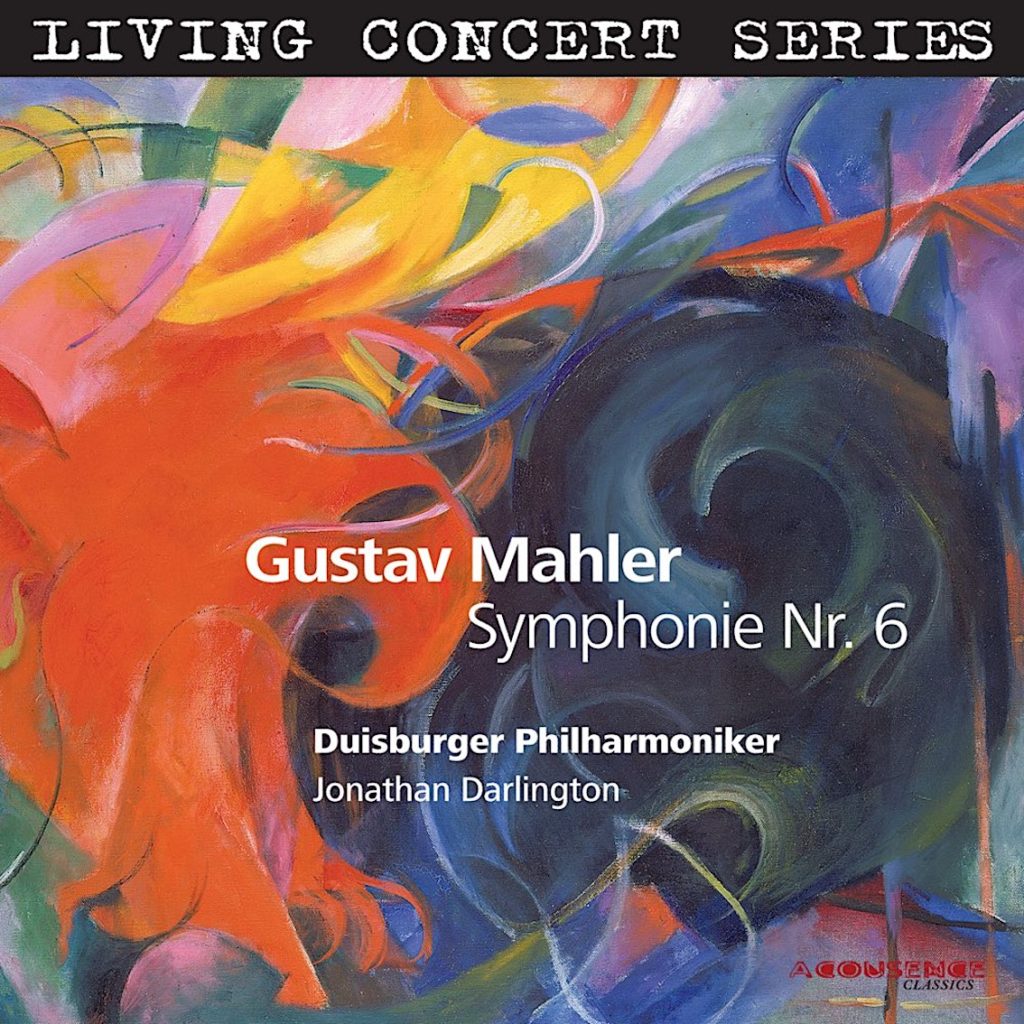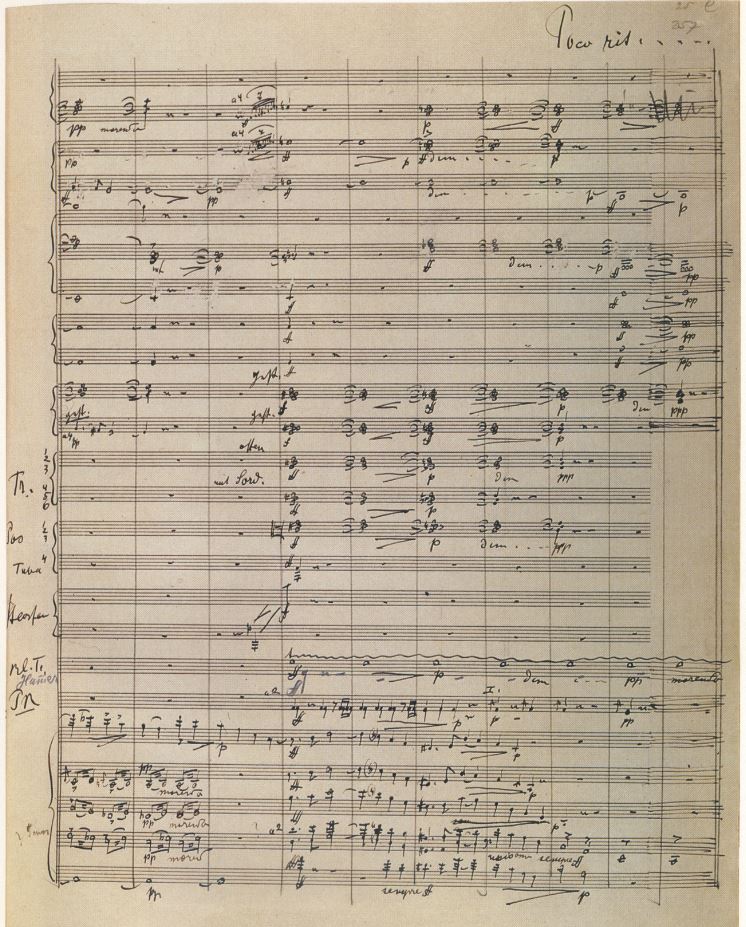Composed
Performances by Gustav Mahler
- 1906 Concert Essen 27-05-1906 – Symphony No. 6 (Premiere)
- 1906 Concert Munich 08-11-1906 – Symphony No. 6
- 1907 Concert Vienna 04-01-1907 – Symphony No. 6
Versions
- 1904-1906: There is some controversy over the order of the two middle movements. Mahler is known to have conceived the work as having the scherzo second and the slow movement third, a somewhat unclassical arrangement adumbrated in such earlier gargantuan symphonies as Beethoven’s Ninth and Bruckner’s Eighth and (unfinished) Ninth, as well as in Mahler’s own four-movement First and Fourth. It was in this arrangement that the symphony was completed (in 1904) and published (in March 1906); and it was with a conducting score in which the scherzo preceded the slow movement that Mahler began rehearsals for the work’s first performance, in May 1906. During those rehearsals, however, Mahler decided that the slow movement should precede the scherzo, and he instructed his publisher Kahnt music publishers to prepare a “second edition” of the work with the movements in that order, and meanwhile to insert errata slips indicating the change of order into all unsold copies of the existing edition. The seriousness of such a decision is not to be underestimated: as Jeffrey Gantz has pointed out, “A composer who premières his symphony Andante/Scherzo immediately after publishing it Scherzo/Andante can expect a degree of public ridicule, and [the reviewer of the first Vienna performance] didn’t spare the sarcasm”. Moreover, this revised, “second thoughts” ordering was observed by Mahler in every single performance he gave; it is also how the symphony was performed by others during his lifetime.
- 1919: The first occasion on which the abandoned, original movement order was reverted to seems to have been in 1919, after Alma had sent a telegram to Willem Mengelberg which said “First Scherzo, then Andante”. Mengelberg, who had been in close touch with Mahler until the latter’s death, and had happily conducted the symphony in the “Andante/Scherzo” arrangement right up to 1916, then switched to the “Scherzo/Andante” order. In this he seems to have been alone: other conductors, such as Oskar Fried, continued to perform (and eventually record) the work as ‘Andante/Scherzo’, per Mahler’s own second edition, right up to the early 1960s.
- 1963: In 1963, however, Erwin Ratz’s “Critical Edition” of the Sixth appeared, and in this the Scherzo preceded the Andante. Ratz, however, never offered any support (he did not even cite Alma’s telegram) for his assertion that Mahler “changed his mind a second time” at some point before his death; but his editorial decision was questioned by few musicians—and even those who did not accept his “third thoughts” ordering (such as John Barbirolli (1899-1970) in his acclaimed 1967 recording) could find that their ‘Andante/Scherzo’ performance would be changed by the record company to “Scherzo/Andante” so as to make their recording agree with the “Critical Edition”. The utter lack of documentary or other evidence in support of Ratz’s (and Alma’s) reverted ordering has caused the most recent Critical Edition to restore the Andante/Scherzo order; however, many conductors continue to perform the Scherzo before the Andante. Moreover, Henry-Louis de La Grange, Mahler’s biographer, referring to the 1919 Mengelberg telegram, has questioned the notion of Alma simply expressing a personal view of the movement order:
- It is far more likely ten years after Mahler’s death and with a much clearer perspective on his life and career, Alma would have sought to be faithful to his artistic intentions… it is stretching the bounds of both language and reason to describe [Andante-Scherzo] as the ‘only correct’ one. Mahler’s Sixth Symphony, like many other compositions in the repertory, will always remain a ‘dual-version’ work, but few of the others have attracted quite as much controversy.
- The dual-version view is one echoed by another major Mahler writer, Donald Mitchell. The matter therefore remains hotly debated.
- Duration:
- Movement 1: Allegro energico, ma non troppo 26.00
- Movement 2: Andante moderato 15.00
- Movement 3: Scherzo 13.00
- Movement 4: Finale (Allegro moderato) 31.00
- Total duration 1.25.00
Publications
- 1906 Kahnt music publishers.
- 1906 Kahnt music publishers: Piano version (4 hands) by Alexander von Zemlinsky (1871-1942).
- 1906 Kahnt music publishers and Universal Edition (UE) music publishers: Piano version (4 hands) by Alexander von Zemlinsky (1871-1942).
1906. Score by Kahnt music publishers.
1906. Score by Kahnt music publishers.
1906. Score by Kahnt music publishers. Piano version (4 hands) by Alexander von Zemlinsky (1871-1942).
Recorded and performed examples on the inner movements’ order by several prominent conductors
Scherzo / Andante
- Erich Leinsdorf, Boston Symphony Orchestra, RCA Victor Red Seal LSC-7044
- Jascha Horenstein, Royal Stockholm Philharmonic Orchestra, Unicorn UKCD 2024/5 (live recording from 1966)
- Leonard Bernstein, New York Philharmonic,[12] Sony Classical SMK 60208 (*)
- Vaclav Neumann, Gewandhaus Orchestra Leipzig, Berlin Classics 0090452BC
- George Szell, Cleveland Orchestra, Sony Classical SBK 47654
- Bernard Haitink, Concertgebouw Orchestra, Amsterdam, Q-DISC 97014 (live performance from November 1968)
- Rafael Kubelik, Bavarian Radio Symphony Orchestra, Deutsche Grammophon 289 478 7897-1
- Rafael Kubelik, Bavarian Radio Symphony Orchestra, Audite 1475671 (live recording of 6 December 1968 performance)
- Bernard Haitink, Concertgebouw Orchestra, Amsterdam, Philips 289 420 138-2
- Jascha Horenstein, Bournemouth Symphony Orchestra, BBC Legends BBCL4191-2
- Georg Solti, Chicago Symphony Orchestra, Decca 414 674-2
- Hans Zender, Saarbrücken Radio Symphony Orchestra, CPO 999 477-2
- Maurice Abravanel, Utah Symphony, Vanguard Classics SRV 323/4 (LP)
- Herbert von Karajan, Berlin Philharmonic, Deutsche Grammophon 289 415 099-2
- Leonard Bernstein, Vienna Philharmonic, Deutsche Grammophon DVD 440 073 409-05 (live film recording from October 1976) (*)
- James Levine, London Symphony Orchestra, RCA Red Seal RCD2-3213
- Kirill Kondrashin, Leningrad Philharmonic Orchestra, Melodiya CD 10 00811
- Václav Neumann, Czech Philharmonic, Supraphon 11 1977-2
- Claudio Abbado, Chicago Symphony Orchestra, Deutsche Grammophon 289 423 928-2
- Milan Horvat, Philharmonica Slavonica, Line 4593003
- Kirill Kondrashin, SWR Sinfonieorchester Baden-Baden und Freiburg, Hänssler Classic 9842273 (live recording from January 1981)
- Lorin Maazel, Vienna Philharmonic, Sony Classical S14K 48198
- Klaus Tennstedt, London Philharmonic Orchestra, EMI Classics CDC7 47050-8
- Klaus Tennstedt, London Philharmonic Orchestra. LPO-0038 (live recording from the 1983 Proms)
- Erich Leinsdorf, Bavarian Radio Symphony Orchestra, Orfeo C 554 011 B (live recording of 10 June 1983 performance)
- Gary Bertini, Cologne Radio Symphony Orchestra, EMI Classics 94634 02382
- Giuseppe Sinopoli, Philharmonia Orchestra, Deutsche Grammophon 289 423 082-2
- Eliahu Inbal, Frankfurt Radio Symphony Orchestra, 1986, Denon Blu-spec cd (COCO-73280-1)
- Leonard Bernstein, Vienna Philharmonic, Deutsche Grammophon 289 427 697-2 (*)
- Michiyoshi Inoue, Royal Philharmonic Orchestra, Pickwick/RPO CDRPO 9005
- Bernard Haitink, Berlin Philharmonic, Philips 289 426 257-2
- Riccardo Chailly, Royal Concertgebouw Orchestra, Decca 444 871-2
- Hartmut Haenchen, Netherlands Philharmonic Orchestra, Capriccio 10 543
- Hiroshi Wakasugi, Tokyo Metropolitan Symphony Orchestra, 1989, Fontec FOCD9022/3
- Leif Segerstam, Danish Radio Symphony Orchestra, Chandos CHAN 8956/7
- Christoph von Dohnányi, Cleveland Orchestra, Decca 289 466 345-2
- Klaus Tennstedt, London Philharmonic Orchestra, EMI Classics 7243 5 55294 28 (live recording from November 1991)
- Anton Nanut, Radio Symphony Orchestra Ljubljana, Zyx Classic CLS 4110
- Neeme Järvi, Royal Scottish National Orchestra, Chandos CHAN 9207
- Antoni Wit, Polish National Radio Symphony Orchestra, Naxos 8.550529
- Seiji Ozawa, Boston Symphony Orchestra, Philips 289 434 909-2
- Yevgeny Svetlanov, State Symphony Orchestra of the Russian Federation, Warner Classics 2564 68886-2 (box set)
- Emil Tabakov, Sofia Philharmonic Orchestra, Capriccio C49043
- Edo de Waart, Radio Filharmonisch Orkest, RCA 27607
- Pierre Boulez, Vienna Philharmonic, Deutsche Grammophon 289 445 835-2
- Zubin Mehta, Israel Philharmonic Orchestra, Warner Apex 9106459
- Thomas Sanderling, Saint Petersburg Philharmonic Orchestra, RS Real Sound RS052-0186
- Yoel Levi, Atlanta Symphony Orchestra, Telarc CD 80444
- Michael Gielen, SWR Sinfonieorchester Baden-Baden und Freiburg, Hänssler Classics 93029
- Günther Herbig, Saarbrücken Radio Symphony Orchestra, Berlin Classics 0094612BC
- Michiyoshi Inoue, New Japan Philharmonic, 2000, Exton OVCL-00121
- Michael Tilson Thomas, San Francisco Symphony, SFS Media 40382001 (*)
- Bernard Haitink, Orchestre National de France, Naïve V4937
- Christoph Eschenbach, The Philadelphia Orchestra, Ondine ODE1084-5B
- Mark Wigglesworth, Melbourne Symphony Orchestra, MSO Live 391666
- Bernard Haitink, Chicago Symphony Orchestra, CSO Resound 210000045796
- Gabriel Feltz, Stuttgart Philharmonic, Dreyer Gaido 9595564
- Vladimir Fedoseyev, Tchaikovsky Symphony Orchestra of Moscow Radio, Relief 2735809
- Eiji Oue, Osaka Philharmonic Orchestra, Fontec FOCD9253/4
- Takashi Asahina, Osaka Philharmonic Orchestra, Green Door GDOP-2009
- Jonathan Nott, Bamberg Symphony Orchestra, Tudor 7191
- Esa-Pekka Salonen, Philharmonia Orchestra, Signum SIGCD275
- Hartmut Haenchen, Orchestre Symphonique du Théâtre de la Monnaie, ICA Classics DVD ICAD5018
- Antal Doráti, Israel Philharmonic Orchestra, Helicon 9699053 (live recording of 27 October 1963 performance)
- Lorin Maazel, Royal Concertgebouw Orchestra, RCO Live RCO 12101 DVD
- Paavo Järvi, Frankfurt Radio Symphony Orchestra, C-Major DVD 729404
- Jukka-Pekka Saraste, Oslo Philharmonic, Simax PSC1316 (*)
- Pierre Boulez, Lucerne Festival Academy Orchestra, Accentus Music ACC30230
- Antonio Pappano, Orchestra dell’Accademia Nazionale di Santa Cecilia, EMI Classics (Warner Classics 5099908441324)
- Lorin Maazel, Philharmonia Orchestra, Signum SIGCD361
- Jaap van Zweden, Dallas Symphony Orchestra, DSO Live
- Libor Pešek, Ceski Narodni Symfonicky Orchestr, Out of the Frame OUT 068
- Václav Neumann, Czech Philharmonic, Exton OVCL-00259
- Zdeněk Mácal, Czech Philharmonic, Exton OVCL-00245
- Vladimir Ashkenazy, Czech Philharmonic, Exton OVCL-00051
- Eliahu Inbal, Tokyo Metropolitan Symphony Orchestra, 2007, Fontec SACD (FOCD9369)
- Eliahu Inbal, Tokyo Metropolitan Symphony Orchestra, 2013, Exton SACD (OVCL-00516 & OVXL-00090 “one point recording version”)
- Gary Bertini, Tokyo Metropolitan Symphony Orchestra, Fontec FOCD9182
- Georges Prêtre, Wiener Symphoniker, Weitblick SSS0079-2
- Giuseppe Sinopoli, Stuttgart Radio Symphony Orchestra, Weitblick SSS0108-2
- Rudolf Barshai, Yomiuri Nippon Symphony Orchestra, Tobu YNSO Archive Series YASCD1009-2
- Martin Sieghart, Arnhem Philharmonic Orchestra, Exton HGO 0403
- Heinz Bongartz, Leipzig Radio Symphony Orchestra, Weitblick SSS0053-2
- Teodor Currentzis, MusicAeterna, Sony Classical 19075822952
- Paavo Järvi, NHK Symphony Orchestra, Tokyo, RCA Victor Red Seal SICC 19040
Andante / Scherzo
- Charles Adler, Vienna Symphony Orchestra, Spa Records SPA 59/60
- Eduard Flipse, Rotterdam Philharmonic Orchestra, Philips ABL 3103-4 (LP), Naxos Classical Archives 9.80846-48 (CD)
- Dimitri Mitropoulos, New York Philharmonic,[12] NYP Editions (live recording from 10 April 1955)
- Eduard van Beinum, Concertgebouw Orchestra, Amsterdam, Tahra 614/5 (live recording from 7 December 1955)
- Sir John Barbirolli, Berlin Philharmonic, Testament SBT1342 (live recording of 13 January 1966 performance)
- Sir John Barbirolli. New Philharmonia Orchestra, Testament SBT1451 (live recording of 16 August 1967 Proms performance)
- Sir John Barbirolli, New Philharmonia Orchestra, EMI 7 67816 2 (studio recording, 17–19 August 1967)
- Harold Farberman, London Symphony Orchestra, Vox 7212 (CD)
- Heinz Rögner, Berlin Radio Symphony Orchestra, Eterna 8-27 612-613
- Simon Rattle, City of Birmingham Symphony Orchestra, EMI Classics CDS5 56925-2
- Glen Cortese, Manhattan School of Music Symphony Orchestra, Titanic 257
- Andrew Litton, Dallas Symphony Orchestra, Delos (live recording, limited commemorative edition)
- Sir Charles Mackerras, BBC Philharmonic, BBC Music Magazine MM251 (Vol 13, No 7) (*)
- Mariss Jansons, London Symphony Orchestra, LSO Live LSO0038
- Claudio Abbado, Berlin Philharmonic, Deutsche Grammophon 289 477 557-39
- Iván Fischer, Budapest Festival Orchestra, Channel Classics 22905
- Mariss Jansons, Royal Concertgebouw Orchestra, RCO Live RCO06001
- Claudio Abbado, Lucerne Festival Orchestra, Euroarts DVD 2055648
- Simone Young, Hamburg Philharmonic, Oehms Classics OC413
- David Zinman, Tonhalle Orchester Zürich, RCA Red Seal 88697 45165 2
- Valery Gergiev, London Symphony Orchestra, LSO Live LSO0661
- Jonathan Darlington, Duisberg Philharmonic, Acousence 7944879
- Petr Vronsky, Moravian Philharmonic Orchestra, ArcoDiva UP0122-2
- Fabio Luisi, Vienna Symphony, Live WS003
- Vladimir Ashkenazy, Sydney Symphony Orchestra, SSO Live
- Riccardo Chailly, Leipzig Gewandhaus Orchestra, Accentus Music DVD ACC-2068
- Markus Stenz, Gürzenich Orchestra Köln, Oehms Classics OC651
- Daniel Harding, Bavarian Radio Symphony Orchestra, BR-Klassik 900132
- Simon Rattle, Berlin Philharmonic Orchestra, BPH 7558515 (live recording from 1987)
- Osmo Vänskä, Minnesota Orchestra, BIS 2266
- Simon Rattle, Berlin Philharmonic Orchestra (live recordings from 1987 and 2018, with DVD of 2018 performance)



